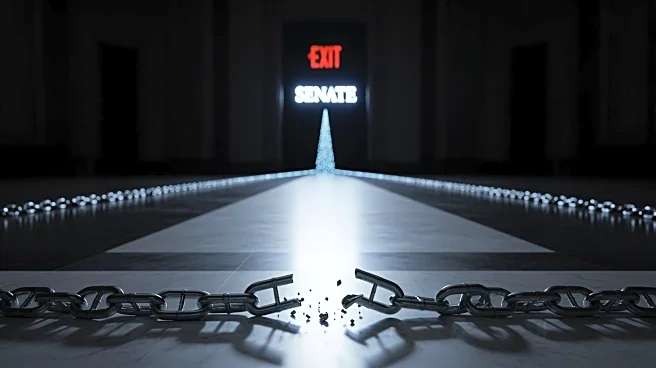What's Happening?
The U.S. Senate is poised to vote on a bipartisan deal to end the longest government shutdown in history, which began on October 1. The agreement, reached between some Democrats, Republicans, and President
Trump's administration, aims to reopen the government until January 30. This deal includes funding for various federal programs, such as food stamps and veterans' benefits, through the next year. A significant development in this process was the decision by a group of moderate Senate Democrats to break ranks with their party, a move that has sparked political backlash. The shutdown has caused widespread disruption, including flight cancellations and delays, and has left food aid benefits in limbo. The Senate is expected to vote on the deal soon, with the House on a 36-hour return notice to vote on the measure.
Why It's Important?
The resolution of the government shutdown is crucial for millions of Americans affected by the disruption of federal services. The shutdown has impacted air travel, with significant delays and cancellations, and has put food aid benefits at risk. The bipartisan deal, if passed, would provide temporary relief by reopening the government and ensuring the continuation of essential services. However, the division within the Democratic Party highlights the ongoing political challenges in reaching consensus on federal spending, particularly concerning health care subsidies. The outcome of this deal could influence future negotiations and the political landscape, especially with upcoming elections.
What's Next?
The Senate is expected to vote on the deal imminently, with the House prepared to reconvene to pass the measure. If the deal is approved, it will temporarily fund the government until January 30, allowing time for further negotiations on long-term solutions. The agreement includes a commitment to vote on extending health care subsidies in December, a contentious issue that has been central to the shutdown. The resolution of the shutdown will also involve addressing the backlog of federal services and ensuring the payment of back wages to federal workers.
Beyond the Headlines
The shutdown has exposed vulnerabilities in the U.S. political system, particularly the challenges of bipartisan cooperation in a polarized environment. The decision by some Democrats to support the deal, despite party opposition, underscores the complexity of balancing political principles with practical governance. The impact on federal workers and beneficiaries of government programs highlights the human cost of political stalemates. The resolution of the shutdown may provide temporary relief, but it also sets the stage for future debates on government funding and policy priorities.









